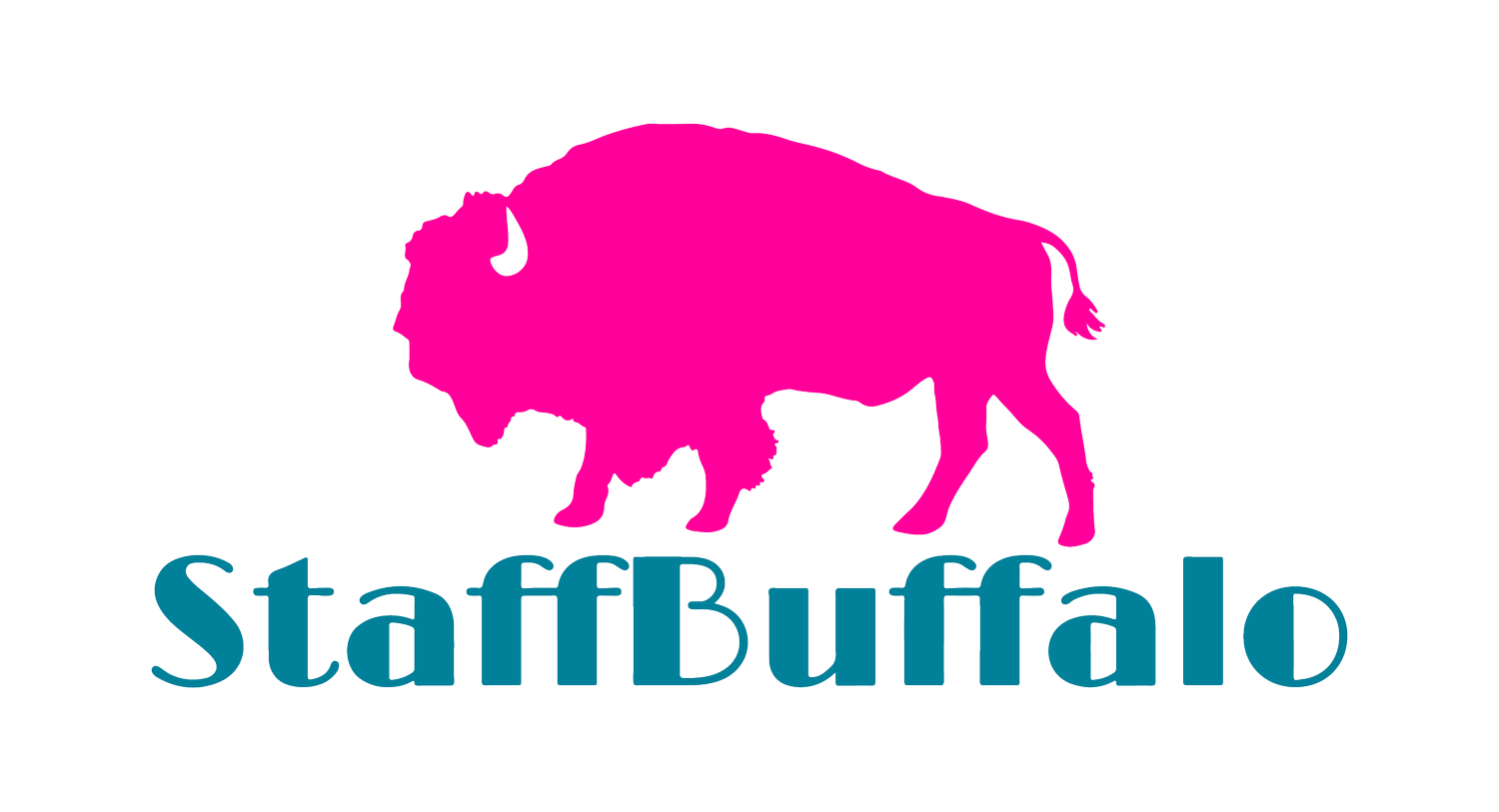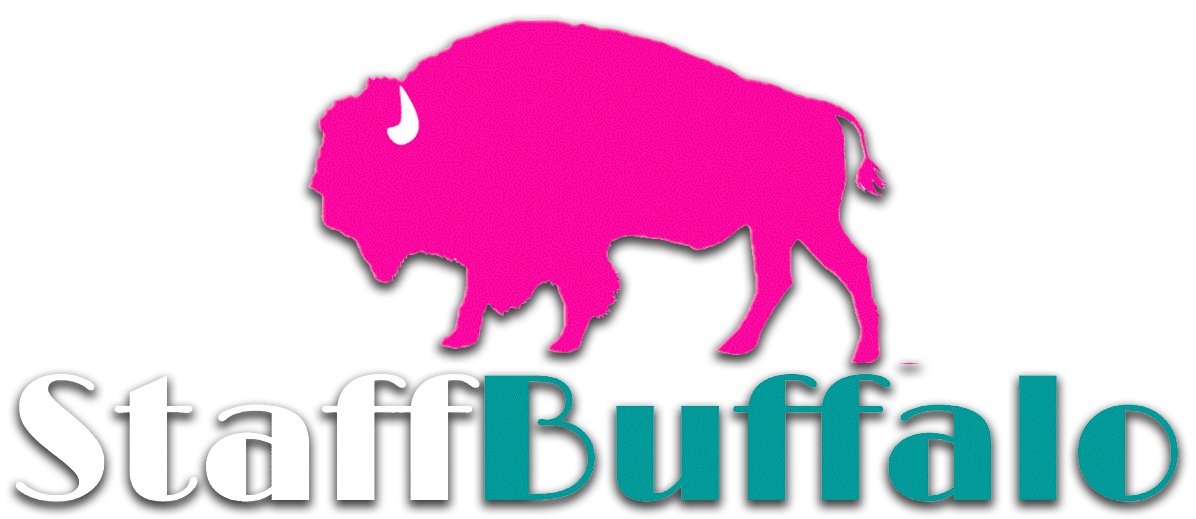StaffBuffalo Phone Interview Preparation Guide
StaffBuffalo, LLC has compiled our favorite pieces of advice to help you prepare for your phone interview! Once you nail the phone interview, check out our In-Person Interview Preparation guide to get prepared for the next steps!
Phone interviews are used to preliminarily screen candidates in order to reduce the number of applicants that will be invited for in-person interviews. Your phone interview should be scheduled in advance by email or phone with the correct number to reach you, and it should be specified who will be calling who (typically the company will call you). If you receive a surprise call from the interviewer, let them know that it is not the best time, but you would love to schedule a time to speak. This will give you the proper time to prepare for the phone interview!
Before the Interview:
Phone interviews are often times harder to master than in-person interviews because it is hard to gauge the interviewer’s reactions without being able to see them in-person. We suggest practicing with a friend to rehearse answers, minimize verbal ticks, and optimize your conversational cadence.
Your overall goal is to get that in-person interview and ultimately land the position. Remember, the phone interviewer is the gateway to that in-person interview, so take it very seriously.
Review the full In-Person Interview guide. Below is a summary:
1. Research the Company
2. Set up a list of at least 5 references
3. Review your social media presence and set up a LinkedIn profile
4. Make sure you have a professional email address
5. Set up a professional voicemail message, a professional ringtone, and ensure that your mailbox is not full
6. Always answer the phone professionally, since you never know who it may be
Ok, you took all the proper steps! Now you have a Phone Interview set-up:
1. Know WHO you are speaking with – Name and title.
a. Someone will be setting up your interview from the Corporate side, whether it is an Internal Recruiter, External Recruiter, HR, or the Hiring Manager.
b. Make sure to gather this information before you hop on the phone and do as much research on the interviewer as possible (see below).
c. Be sure you know whether the interviewer is calling you or if you are calling the interviewer.
2. Freshen up your research on the Company and position.
3. Locate the interviewers on LinkedIn and research their background.
a. You may find that you worked at the same company in the past or volunteer for similar causes.
b. Do not reference people you have in common on LinkedIn because they may not personally know the LinkedIn individual, which could become awkward.
c. Prepare questions specific to each interviewer:
i. Ask what their focus is within the organization, discuss current events within their professional focus, or bring up a common interest that you identified.
ii. Try not to make it obvious that you did the research by mentioning something relevant to your background or interests and gauge their response.
4. Be prepared 10 minutes before the phone call. This will give you time to clear your mind and focus on the task at hand.
5. Make sure you are in a location that is quiet and clear of all distractions.
a. Do NOT play with your phone or computer, even if you are trying to research the company while you are on the phone.
b. Be fully prepared in advance, so that you do not have to do any last minute research!
6. Have a printed version of your resume and the job description in front of you. Highlight skillsets and accomplishments that you want to emphasize that are related to the job description to show that you are engaged in the process and can relate the job back to your skillset.
a. Review and commit your resume to memory.
b. Think about your skills and accomplishments and be prepared to work them into the interview through examples and answers to the interview questions.
c. Review the positive and negative progression of your career, reasons why you left each role, and the things that you learned.
7. Have notes and questions prepared in advance for the interviewer in front of you (and don’t forget to have a pen!).
a. Cross out questions as they are answered, so that you don’t re-ask the same questions. If you redundantly ask the same question, you will appear as though you are not listening.
b. While you are listening to the interviewer, either jot down questions for later or ask right away.
8. Answer the phone yourself, with an introduction of who you are [i.e. Hello, this is Jane Doe (in an upbeat tone of voice. See SMILE below)].
9. Do not smoke, eat, drink, or chew on anything such as gum or a pen.
a. Exception: Have water with you in case you need it to combat a cough or tickle in your throat.
10. Speak slowly and clearly, so that nothing is misinterpreted by the interviewer, and be concise but thorough with your answers.
11. SMILE We know it sounds silly, but it is important to smile when you’re on the phone. You can hear someone smile over the phone. Smiling will ensure you sound enthusiastic about the opportunity and passionate. The hardest thing about a phone interview is that you cannot see who you are speaking with to develop a connection. Sometimes the interviewer may feel the candidate sounded monotone, bored, and not a good fit for the Company culture. To avoid this, smile while talking, putting you in the right mindset.
a. Note: At StaffBuffalo, LLC, we have had HR tell us they didn’t want to meet a candidate because they sounded boring over the phone. Since we have fantastic relationships with our candidates, we know otherwise and convince the Hiring Managers to bring them in for an In-Person interview, where in many cases they have been offered the job! This shows the importance of smiling over the phone and is a key tip for success!!
12. Don't interrupt!! Listen carefully to the interviewer and don't start speaking until the interviewer finishes the question.
a. If you have something you want to say, jot it down on your note pad and mention it when it's your turn to talk.
13. Take your time to thoughtfully respond to the questions, but keep in mind that the interviewer cannot read your body language. Being prepared for personality and situational questions will speed up your reaction time and reduce the lulls in the conversation.
a. If you need the interviewer to repeat the question, simply ask.
14. Always have a non-cliché response to cliché interview questions:
a. “What are your strengths?”, “What are your weaknesses?”, “Tell me about yourself.”, “Tell me a time when you overcame a challenge and how did you do it?”, “Why would you be a good fit for this position?”
15. Be prepared to “sell” yourself by being able to articulate why you are a good fit for the organization and why you are a good fit for the position.
16. REMEMBER, you are interviewing the company as much as they are interviewing you. Ask questions that will help determine if the company is a good fit for you!
a. Ask about culture
b. Ask why the position is open
c. Ask what are they looking for in a candidate
d. Ask what the interviewer likes best about the company
e. Ask about volunteer opportunities and mentorship within the company
f. Ask any other questions that may help you determine if the company is the right fit
g. Do not focus on salary. HR may go over salary, so be prepared to give them what you are currently making and your targeted salary if you were to start in this position.
17. Before you hang up the phone, thank the interviewer for their time and reiterate your interest in the company and the position. Ask the phone interviewer what the next steps will be, so that you can be fully prepared.
After the Interview:
1. Send a “Thank You” email within 12 hours of the phone interview, demonstrating your interest in the role and stating that you are interested in the next steps of the process.
a. If you decided from the phone interview that you do not want to move forward, politely thank the interviewer for their time and let them know that after speaking with them, you don’t think that this specific role would be a good fit for you, but to keep you in mind for other opportunities.
2. Do NOT follow up excessively. You do not want to seem needy or overanxious for the role after you send the “Thank you” email.
Job Seeker Services:
Resume Formatting Service Interview Workshop Networking Workshop Social Media Audit


